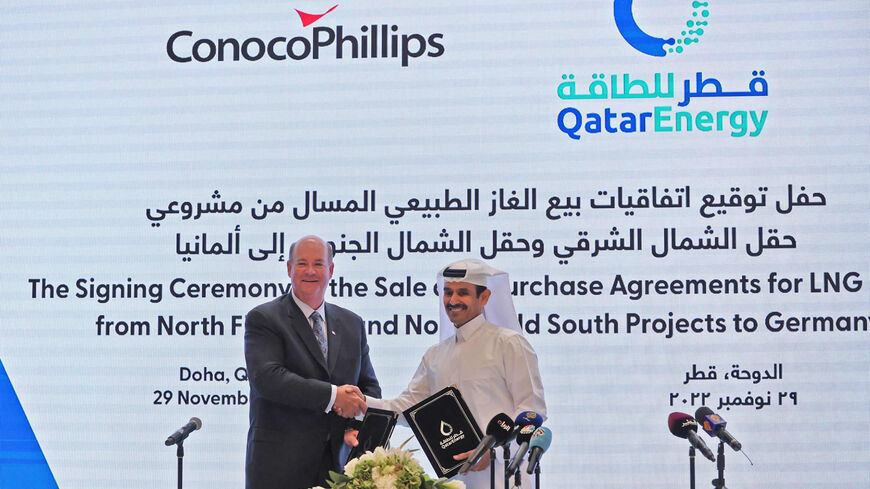Qatar and Germany have finally signed a long-term natural gas supply agreement.
The state-owned QatarEnergy signed a deal with the US energy giant ConocoPhillips to supply Germany with about 2 billion cubic meters of liquified natural gas per year. The agreement is for 15 years, but the first shipment will not take place until 2026, the official Qatar News Agency reported.
The gas will come from Qatar's North Field East and North Field South offshore gas fields, QatarEnergy said in a statement. North Field East is one of the biggest natural gas fields in the world.
Per the agreement, a subsidiary of ConocoPhillips will purchase agreed-upon quantities of gas from Qatar and the gas will then be delivered to a German terminal, Reuters reported.
Why it matters: Germany has been seeking a long-term gas deal with Qatar since the Russian invasion of Ukraine earlier this year. Germany depends on Russia for about a third of its natural gas, and this has put them in a difficult position as a NATO member opposed to the invasion.
The amount of gas Qatar will provide Germany constitutes only a fraction of the 142 billion cubic meters the European country imported in 2021. However, the deal is important because it helps Germany diversify its energy sources, according to Dr. Cinzia Bianco, a research fellow at the European Council on Foreign Relations.
"The deal is significant nonetheless because Germany has decided to focus its strategy on diversification of supply and in this sense it prefers certainly smaller volumes but from several different, reliable, sources," Bianco told Al-Monitor.
Germany has looked to other Gulf states as well amid the energy crisis. In September, the Abu Dhabi National Oil and Company signed a deal with Germany’s RWE AG to start sending natural gas to Germany late this year.
The agreement also represents the continued importance of Qatar's hydrocarbons in the world economy, according to Bianco.
"For Qatar this deal instead is significant because it managed to get one of the most vocal anti-hydrocarbons voices in the world, Germany, to commit to importing fossil fuels beyond the fatal cut-off date of 2035," she said. "This is a key political sign to investors in the oil and gas space that they can still bet on hydrocarbons and finance the expansion projects pushed by Qatar and the other Gulf monarchies."
Bianco added that Germany is seeking a more comprehensive energy partnership with Gulf states in the future focused more on renewable energy.
Like other Gulf states, Qatar has increased its renewable energy capabilities this year.
The QatarEnergy-ConocoPhillips deal followed a major gas agreement between QatarEnergy and China’s Sinopec last week. Some observers at the time said the 27-year deal could jeopardize Europe’s efforts to obtain Qatari gas, since Qatar is now committed to supplying China with a significant amount of gas.
Analyst Simon Watkins wrote for OilPrice.com yesterday that "China will gain an unparalleled hold” over Qatar’s gas reserves with the deal.
Know more: The QatarEnergy deal with Germany came at a tense time in Qatar-Germany relations. Qatar summoned the German ambassador last month after a German official criticized Qatar’s human rights record ahead of the World Cup in Doha.
Things got worse when Qatar’s World Cup ambassador condemned homosexuality in remarks to a German media outlet earlier this month.
Qatar’s largest exports to Germany consist of fuel and plastics, while Germany’s biggest exports to Qatar are machinery, vehicles and steel, according to Trading Economics.







